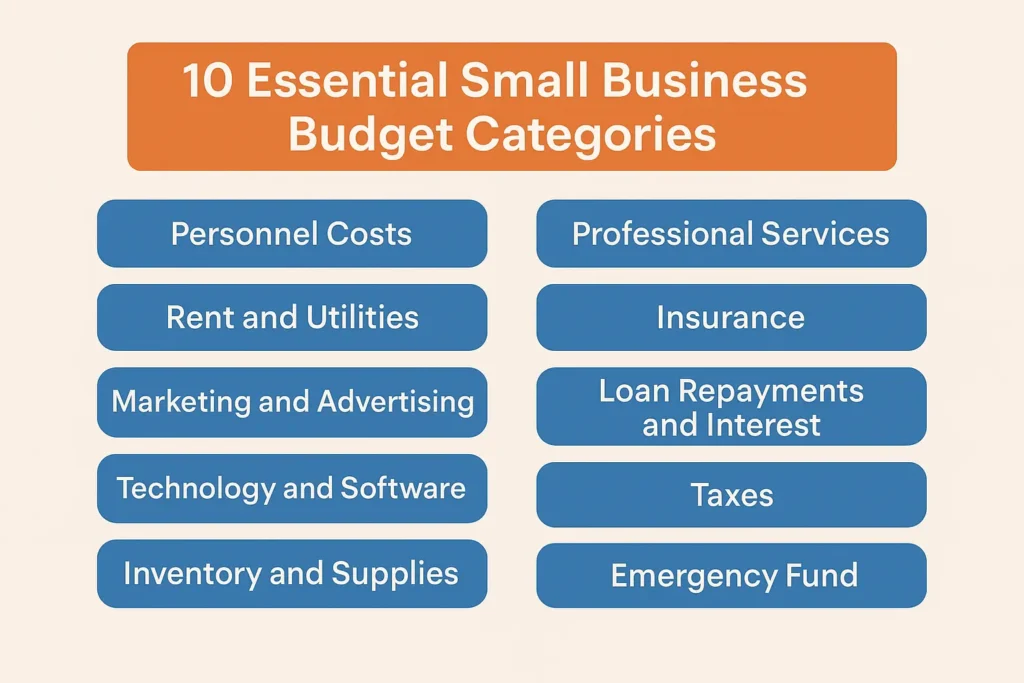In the dynamic business world, keeping track of your finances is crucial for success. You can use it to acquire the necessary knowledge to make well-informed decisions, optimize resource allocation, and protect your profits. This is where budgeting and expense categorization come in as powerful tools.
Understanding the most common categories of business budgets and expenses is crucial for every business owner. This guide will provide a roadmap that can lead you to that understanding. Whether you’re a seasoned entrepreneur or just starting, this guide will equip you with the knowledge to manage your finances confidently.
Table of Contents
What is the Business Budget and Expense Category?
Imagine a detailed map of your financial landscape. Budget categories represent the broad regions, encompassing marketing, rent, and payroll. Expense categories function as landmarks within each region, pinpointing specific costs like website hosting, office supplies, and employee salaries.
By defining and understanding these categories, you gain a clear picture of where your money flows. This empowers you to:
- Create realistic and achievable budgets: Allocate funds strategically based on historical data and future projections.
- Track spending efficiently: Monitor expenses meticulously to identify areas for improvement and cost-saving opportunities.
- Simplify tax filing: Categorize expenses accurately to maximize tax deductions and minimize liabilities.
- Gain valuable insights: Gather data on expenses to gain insights for making wise choices regarding future investments and plans for expansion.
Common Business Budget and Expense Categories

Now, let’s get into the diverse terrain of business expenses. Remember, these categories serve as a general framework; you can adapt them to suit your industry and business model.
Operational Expenses:
- Rent and utilities: Costs associated with your physical workplace, including rent, electricity, water, and waste disposal.
- Marketing and advertising: Expenses incurred to promote your products or services, such as online advertising, social media marketing, and print materials.
- Technology and software: Costs related to essential business software, hardware, internet subscriptions, and maintenance.
- Insurance: Premiums for various insurance policies to protect your business assets, employees, and operations.
- Professional services: Fees paid to external professionals like certified accountants, lawyers, and consultants.
- Travel and entertainment: Expenses linked to work-related trips, dining out with customers, and attending professional gatherings.
- Supplies and equipment: Costs associated with office supplies, cleaning materials, and necessary equipment for your operations.
Personnel Expenses:
- Salaries and wages: Compensation paid to your employees, including base salaries, bonuses, and overtime pay
- Payroll taxes: Employer Social Security, Medicare, and unemployment insurance contributions
- Employee benefits: Costs associated with health insurance, paid time off, and other employee benefits packages
- Training and development: Investments in employee training programs and professional development opportunities
Financial Expenses:
- Bank fees: Charges levied by your bank for account maintenance, transactions, and other services
- Loan interest: Interest payments on business loans and financing arrangements
- Merchant fees: Charges incurred when processing credit card payments from customers

Other Expenses:
- Taxes: Local, state, and federal taxes applicable to your business operations
- Donations and sponsorships: Charitable contributions and sponsorships aligned with your brand values
- Miscellaneous expenses: Any other costs not categorized above, such as repairs, professional licenses, and subscriptions.
Telephone:
Telephone expenses encompass various communication costs, including:
- Landline phone bills
- Mobile phone bills
- Internet calling services
- Video conferencing subscriptions
Office space rent:
This category includes the rent and associated costs of your physical workspace, such as:
- Base rent
- Maintenance fees
- Property taxes
- Utilities (if not included in rent)
- Janitorial services
Advertising:
Advertising expenses cover various marketing and promotional activities, like:
- Marketing on the Internet: Includes search engine marketing and social media advertising
- Print advertising (newspapers, magazines, brochures)
- Television and radio advertising
- Pay-per-click advertising
- Content marketing (blogging, social media content creation)
- Public relations and influencer marketing
What are Tax Deductible Business Expenses
Businesses can claim various ordinary and necessary expenses as tax deductions, per the Internal Revenue Service (IRS) guidelines.
Some everyday tax-deductible expenses include:
- All operational costs listed above
- Employee salaries, wages, and benefits
- Interest on business loans
- Marketing and advertising expenses
- Rent and utilities for your business location
- Travel and entertainment expenses for business purposes
- Home office expenses (if you meet IRS qualifications)
- Depreciation of business assets
Consulting with a tax professional is crucial to maximizing deductions and complying with tax regulations.
Non-Tax-Deductible Business Expenses
While many business expenses offer valuable tax benefits, some don’t qualify for deductions.
Here are some common non-deductible expenses:
- Personal expenses: Costs not directly related to your business operations, such as personal meals, entertainment, and travel
- Fines and penalties: Fines incurred for violating laws or regulations, late fees, and tax penalties
- Political contributions: Donations made to political campaigns or candidates
- Lobbying expenses: Costs associated with influencing legislation or regulations
- Illegal activities: Expenses related to any unlawful business activities
Tips for Effective Budget and Expense Management:
- Review your industry benchmarks: Research average expense ratios for your industry to establish realistic budget allocations
- Utilize accounting software: Invest in user-friendly accounting software to automate expense tracking and categorization
- Set realistic goals: Avoid overly ambitious budgets that don’t account for potential fluctuations
- Conduct regular reviews: Analyze spending patterns monthly or quarterly to identify areas for improvement
- Seek professional guidance: Consult an accountant or financial advisor for personalized budgeting and tax advice

Conclusion:
Managing your business budget and expenses effectively is an ongoing process. By understanding common expense categories, differentiating between tax-deductible and non-deductible costs, and implementing intelligent practices, you can control your finances, optimize your tax position, and fuel sustainable business growth.
Consistent monitoring, strategic planning, and professional guidance are crucial to navigating the dynamic financial landscape and achieving your business goals.
Frequently Asked Questions
1. Why is budgeting important for small businesses?
Budgeting helps manage cash flow, plan for expenses, and set financial goals, all of which contribute to overall business success.
2. How often should I review my business budget?
It’s advisable to review your budget monthly to track performance and make necessary adjustments.
3. Can I handle bookkeeping myself or should I outsource?
While some small business owners manage their bookkeeping, outsourcing bookkeeping services to professionals can save time and ensure accuracy.
4. What percentage of revenue should go to marketing?
A standard recommendation is to allocate 7-8% of gross revenue to marketing, although this can vary depending on the industry and growth goals.
5. How do I build an emergency fund for my business?
Aim to set aside 3-6 months’ worth of operating expenses in a separate account to cover unexpected costs.






